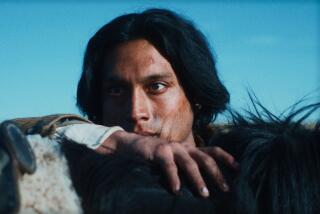TV review: ‘POV: Mugabe and the White African’
- Share via
“Mugabe and the White African,” which makes its television premiere Tuesday night on the PBS series “POV,” is a documentary film by Lucy Bailey and Andrew Thompson about Zimbabwean Mike Campbell, who took Robert Mugabe’s government to court in an effort to save his family farm and to have Mugabe’s “land reform” program declared officially illegal. Campbell, who died in April at age 78 from what his family described as the lingering effects of a beating by Mugabe loyalists, won that battle, though anyone with a lick of sense can see that he was bound to lose the war.
The battle, however, is the subject of the film, which is cut to build toward a moment of triumph. Campbell, who had raised mangoes and corn on his Mount Carmel farm since 1974 — and of which he became legal owner, post-Zimbabwean independence, in 1980 — became well-known, even before this film, as a last, nearly lone voice of refusal.
“It’s quite surreal that someone who is as gentle at heart as Mike is about to take on a man who has brought death to thousands,” Campbell’s son-in-law Ben Freeth says as they head off to what they believe will be their day in court, before the Southern African Development Community Tribunal in Namibia.
It is hard not to sympathize with its protagonists: Mugabe’s government targeted white land owners exclusively in its expropriations; it has Campbell, his wife, Angela, and Freeth attacked. And the white-haired Campbell possesses a sangfroid that seems cinematically superhuman. (“I don’t think there’s much use getting excited,” he says, told of armed men outside. “I’ll go out when I finish my drink.”) He is pictured as a good boss, as well, a color-blind man in love with his country.
“I happen to be white, so I’m a white African,” says Campbell, who was born in what was then Southern Rhodesia.
The subtler shadings of this question are not explored. Indeed, though its case seems clear-cut, there are problems with the film. Some were surely a byproduct of its semi-covert production: the Mugabe government would have no interest in stating its case for a film critical, or even impartially interested, in its practices; it is a dictatorship that uses violence to maintain power. (Its legal team walks out of the tribunal when its request to further delay the case is refused.) But some are structural: I felt at times that I was watching a sort of commercial, a document without historical or wider contemporary context whose contrasting images of prosperity and ruin told a story of white capability and black chaos. (Freeth likens Zimbabwe to a football game without rules or referees.)
It is oddly lacking in black African voices. From Campbell’s side there is really only his South African instructing attorney, Elize Angula; and from his opponents’ side there is the man who believes he is the owner of Campbell’s property, the son of a high-ranking official in the ruling party. Mugabe himself is present in film clips and sound bites to which he brings the crazy: “If rigging the elections means winning the elections through majority voting then let it be.”
Whenever Campbell or (mostly) Freeth are seen with their black workers, the workers are mostly talked at, not with. (“We are all children of God,” says Freeth. “We can all live here together.”) Whether or not that accurately represents their relationship, there is something in these scenes that smacks of the very sort of colonial paternalism that African liberation movements gave the lie to, and from an American perspective, reminds one of the false equivalencies of Jim Crow.
More to Read
The complete guide to home viewing
Get Screen Gab for everything about the TV shows and streaming movies everyone’s talking about.
You may occasionally receive promotional content from the Los Angeles Times.







